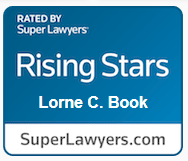Client Login
×PRACTICE AREAS
ASSOCIATIONS
TESTIMONIALS
“Thank you Lorne for AWESOME service! We have been meaning to get our estate plans in order for a long time. We are going to sleep great tonight!”
-Vicki K.
“Mr. Book made our estate planning experience extremely easy and unburdening. We felt welcomed the whole time at his office and his assistant Barb never failed to show us their warm and friendly personality. We will be using their services again in the future!”
-Jose and Ana N.
What is “Probate”?
Transferring ownership of cash, property, or real estate out of a deceased person’s name and into a living person(s)’ name can happen in several different ways. One way is through a court proceeding. Probate is the name given to that court proceeding.
To be clear, a probate proceeding is a lawsuit. What’s more, there are different types of probate proceedings. Each one has parties, lawyers, judges, and hearings. Most of the time these suits are “uncontested”, meaning no one is actually fighting over anything (although that certainly does happen – Google “Aretha Franklin’s estate”) and the parties are just asking for the court’s approval to move forward with transferring ownership of the deceased’s property to one or more living people.
In the most common type of probate proceeding, the court is asked to examine and approve a deceased person’s Last Will and Testament. Wills have strict requirements which often differ by state. The court is tasked with examining the Will and determining its validity. Depending on what the Will says, the court may take further action like appointing an overseer of the estate or requiring future hearings as money comes in or goes out of the estate.
Nearly every probate proceeding requires hiring an attorney in some form or another. Depending on your state of residence, the attorney fees can be modest or extremely high. California and Florida are notoriously expensive probate states. Texas, by comparison, is not (at least not for uncontested proceedings).
One last point: virtually all probate proceedings are avoidable with advanced planning. A hallmark feature of a revocable living trust is that, for property held “in trust”, a probate proceeding is not required to transfer the ownership once a person is deceased.
Remember, probate is a lawsuit filed to ask a court approve transferring ownership of property from the deceased to the living. In some cases it is expensive, in others it is not. In virtually all cases, it is avoidable with advanced planning.
The post What is “Probate”? appeared first on BOOK LAW FIRM.
Phone
Fax
214-975-2365







